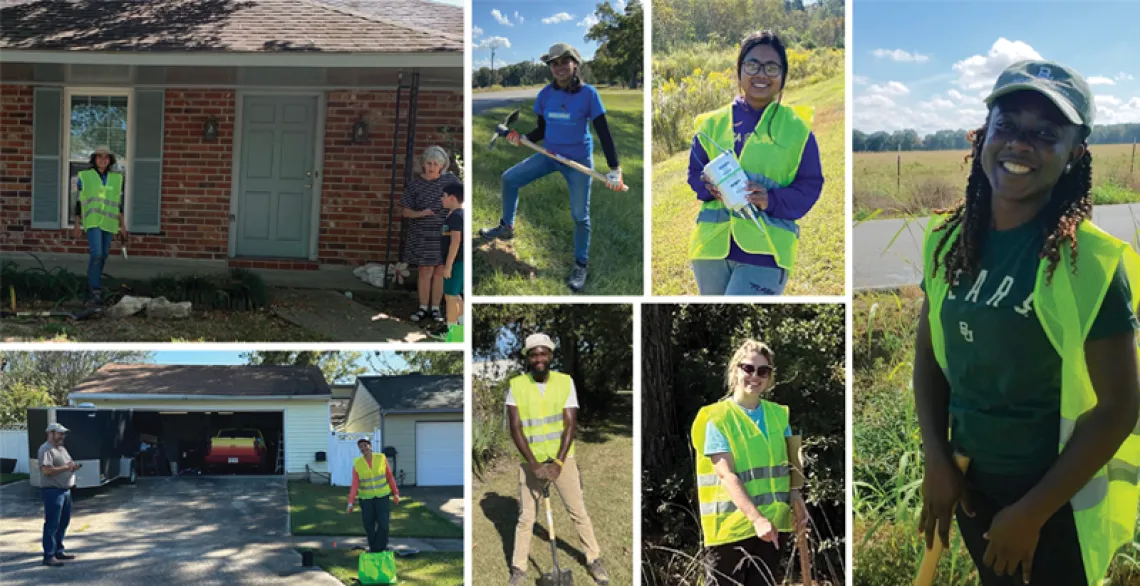Volunteer-Led, Short-Term, Geophysical Field Experiment: Lessons for Inviting Broader Participation, Building Public Trust, and Communicating Science

Photos from the Southern Louisiana Micro-Seismicity (SOLAMS) Experiment. (Source: GeoSociety.org)
Click here to read the full article on GSA Today.
The geosciences have made no progress in the ethnic and racial diversity of U.S. Ph.D. graduates for decades (Bernard and Cooperdock, 2018). In the past two decades, only a few institutions have driven the increase in the racial and ethnic diversity of U.S. geoscience undergraduate degree recipients, with 40% of geoscience programs failing to graduate more than one student from a marginalized group per year (Beane et al., 2021). In contrast, the benefits of diverse groups in science, including unique approaches to problem solving and the framing of research questions, are well known (Guterl, 2014; Phillips, 2014). Diversity, equity, and inclusion are therefore critical in evolving research frontiers, such as the renewable energy transition (Pearl-Martinez and Stephens, 2016) and climate change mitigation (Burke et al., 2021). Studies have also shown the value of using local and Indigenous knowledge along with scientific knowledge in disaster risk reduction (Mercer et al., 2010). Homogeneous groups simply tend not to ask the same questions as diverse groups (Tilghman et al., 2021).
Despite the acknowledged potential benefits, real-world examples where diverse groups have played a critical role in spearheading innovation in geoscientific research are few. This situation raises the question of whether the geosciences can successfully recruit and retain diverse scholars into a discipline if they do not see themselves represented in leadership roles or do not have a sense of belonging. To improve, the geoscience workforce needs to take a more inclusive trajectory with the involvement of underrepresented groups in leadership roles. Following Todd et al. (2023), we define diverse groups as “those historically underrepresented, as a construct of ableism, gender, sexuality, cultural, and racial identities.”
We demonstrate the importance of broad inclusivity through an unusual geophysical field experiment that was conducted in Louisiana, on the U.S. Gulf Coast, in 2022. The Southern Louisiana Micro-Seismicity (SOLAMS) Experiment (SOLAMS, 2022) involved hundreds of person-hours of fieldwork to site, install, and recover geophysical instruments. Typically, this work would be completed by members of an existing single research group or collaboration. Instead, we chose to offer these field experiences and research opportunities to nonspecialist STEM students, which attracted a more diverse research group of self-selected participants. The project’s impacts were magnified by being a short-term offering that also involved public communication as an integral part of the experiment. Such a project is one step toward enhancing inclusivity and building public trust.
Importance of the U.S. Gulf Coast
The Gulf Coast plays a critical role in the energy security of the U.S. Louisiana alone hosts close to 50,000 miles of pipelines that transfer oil and gas resources to the coast and international markets and northward for distribution across North America. The state also hosts two of the four sites of the U.S. Strategic Petroleum Reserve, the world’s largest supply of emergency crude oil. The devastating impacts of natural and anthropogenic disasters and long-term and seasonal subsidence (Kent and Dokka, 2013; Luttrell et al., 2023) on Gulf Coast communities are also well documented. The damages are compounded by environmental concerns in the energy-intensive corridors, where communities continually adapt to natural or human-induced changes and extreme weather events (Anenberg and Kalman, 2019).
Historically, policies implemented in the Gulf Coast region do not include scientific objectives that engage citizens in formulating research questions, understanding their impacts, or contributing to research (Colten, 2017). Whether this discrepancy has stalled scientific progress in geographic areas that are not typically addressed by majority groups remains an open and important question. Engaging the local communities respectfully and effectively was a strong priority when planning this field experiment, and this engagement was both aligned with and supported by our goal of including a broad group of field participants.

